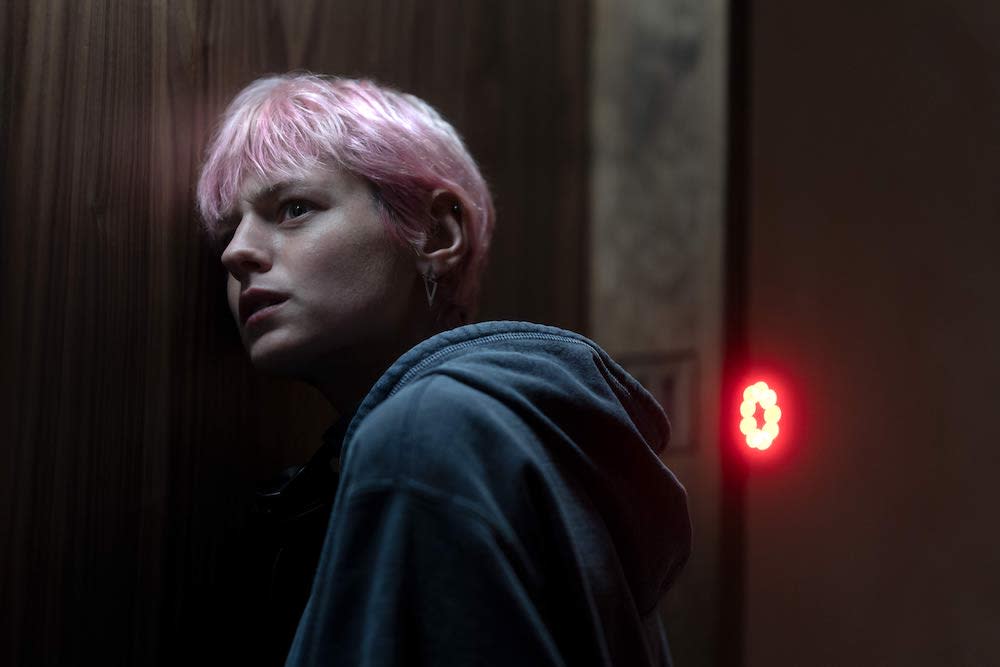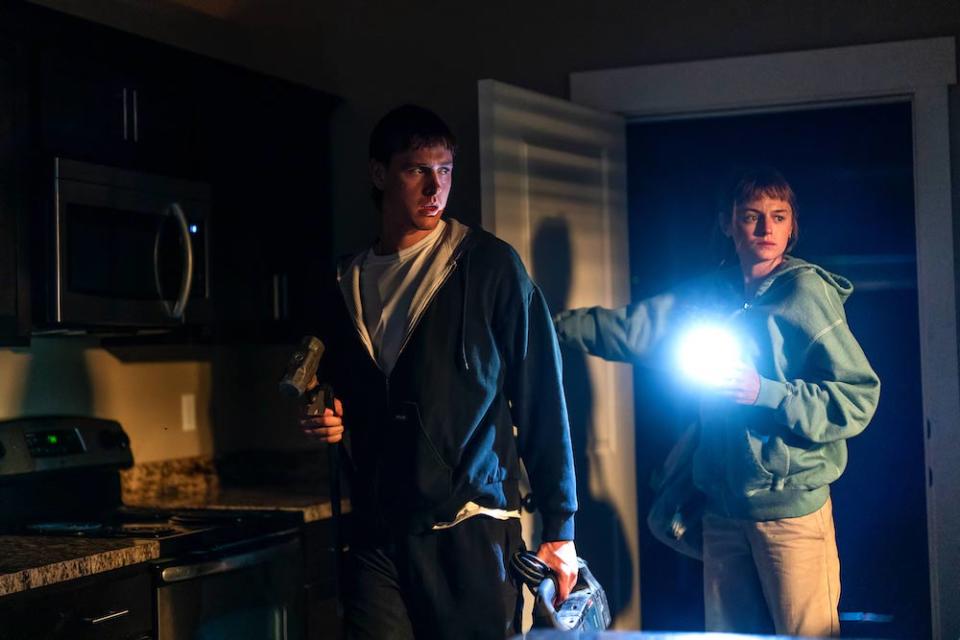‘A Murder at the End of the World’ Is a Curious Interrogation of Obsession, Distraction, and Death

- Oops!Something went wrong.Please try again later.
- Oops!Something went wrong.Please try again later.
Readying to share an excerpt from her first book, an author stands at the podium and warns the room she’s going to start with the ending. “I was told you’re not meant to do that at these readings,” she says, “but I’m going to do it anyway.” Ultimately, Darby Hart (Emma Corrin) omits a few key details of her favored passage — she’s there to sell books, after all, and has to hook an audience who initially showed up to hear from another writer — but the choice speaks volumes about who she is and what her true crime story is designed to do. It’s not about whoever’s waiting at the end of the investigation; it’s not about studying a killer, learning from his twisted psyche, or even catching him (and it is, pretty much, always a “him”). Instead, Darby’s account invites readers to reconsider what’s right in front of them, whether it’s what’s driving them to solve puzzles in the first place, or the person at their side, helping to put the pieces together.
“A Murder at the End of the World” is a curious interrogation of murder-mysteries. The genre’s building blocks are all there — a detective, a murder, and a group of suspects stuck in an isolated setting — and the promise inherent to a whodunit (aka, who did it) is indeed fulfilled. But co-creators Brit Marling and Zal Batmanglij (“The OA”) aren’t looking to invent another “Knives Out,” “Poker Face,” or “Columbo.” Darby’s case isn’t one of many; it’s one of one, connecting her past and future in ways both intimate and widespread. The seven-episode limited series (available on Hulu, produced by FX) may, in success, be franchised, but its disinterest in setting up sequels is part of its appeal, along with its eerie vibes, environmental motifs, and pursuit of warmth in a cold, dying world. Darby (via Marling and Batmanglij) is going to crack the case, but she’s going to do it her way — with, pardon the pun, a little less process and a little more Hart.
More from IndieWire
Darby’s reading sets the series’ two timelines in motion. One follows Darby’s past, when she was a young Iowan whose relationship with her father, the county coroner, sparked an interest in unexplained deaths. One case, involving a local woman buried in her silver earrings, leads Darby to post questions online, and Bill Farrah (Harris Dickinson) responds. A relationship is born, first over reddit messages, then via webcam, and before you know it, they’re meeting in person. Together, they work the long-dormant investigation that forms the basis for Darby’s book, and as she states in the opening pages, they fall in love.
Details of Darby and Bill’s past are woven into her present adventure, which starts up right after her bookstore reading. When she gets home, Darby gets a text from Ray (Edoardo Ballerini), a virtual assistant to “the king of tech,” Andy Ronson (Clive Owen). An average Joe compared to the real world’s eccentric billionaires, Andy is preparing to host a “small gathering of minds […] to discuss technology’s role in ensuring a human future,” and he wants little ol’ Darby to attend (presumably because of her background in coding).
The trip — to an undisclosed destination, for an indeterminate length of time — is all-expenses paid, but what really seals the deal for Darby is Andy’s wife, Lee Andersen (Brit Marling). Described as “the greatest female coder who ever lived,” Lee once wrote a “manifesto” about “how misogyny was destroying the early promise of the internet.” Darby, along with plenty more progressive-minded thinkers, found her words as inspiring as her work, but the rest of the internet responded in unkind fury: Lee was doxxed so badly she had to go into hiding, and even after marrying a powerful tech giant, she would only resurface on the rarest of occasions.
The retreat is one of them, and Darby can’t wait to meet her, but first she has to get to know the rest of the guests. There’s Sian Cruz (Alice Braga), a doctor-turned-astronaut who became the first woman to walk on the moon and now plans to colonize the lunar surface; Lu Mei (Joan Chen) is focused a bit closer to home, as Andy’s Chinese rival aims to build smart cities right here on Earth; David Alvarez (Raúl Esparza) is Andy’s right-hand man, but the venture capitalist doesn’t think he gets enough credit for his boss’ global impact; Martin Mitchell (Jermaine Fowler), a blockbuster film director, has no obvious ties to Andy, but he’s eager to push the boundaries of how films are made using some of Andy’s inventions; Oliver (Ryan J. Haddad) is a robotics engineer, Ziba (Pegah Ferydoni) is an environmental activist, and Rohan (Javed Khan) is a climatologist determined to protect our oceans.
All of them have been flown to an exclusive hotel in Iceland, which Andy designed himself, in order to save the planet, basically. “Margaret Atwood said in an article that the nearer we get to the climate crisis, the fewer choices we have,” Andy says, looking across the table at his hand-selected saviors. “But we still have some, and we have to start making them.” In the coming days, his little symposium hosts a handful of presentations (some significant, others head-scratching), but Andy’s grand plans go awry as soon as someone turns up dead. Who, when, and how are all considered spoilers by FX, but it should go without saying that Darby once again puts her detective skills to good use, poking and prodding everyone while working to explain the titular murder.

As is often the case with Marling and Batmanglij, moments both super-cheesy and unnecessarily weird can distract from the otherwise somber, serious nature of “A Murder at the End of the World.” An Iowan dive bar filled with beer-swilling farmers chooses a miserably slow cover of “Moon River” as the night’s soundtrack. Hacker gobbledygook never sounds realistic or natural, even from characters meant to be respected coders. Lee and Andy’s child is named Zoomer, and no one — no one — bats an eye. Select pieces of exposition invite similarly side-eyed scrutiny (one character endears himself to Lee — a woman viciously harassed by strangers — by showing up uninvited at her home, refusing to leave, and sleeping on her porch), but for the most part, “Murder” steers clear of the jarring tonal choices that ran rampant in “The OA.” While some of its creative flourishes are actually fun — you can’t kill someone in a snowy hotel without nodding to “The Shining” — its largely grounded, purposeful, and affectingly earnest.
The creators, writers, and directors put environmentalism at the forefront, asking audiences a somewhat familiar question: How do we weigh the death of one person (or two, or three) against the death of millions? Creating a trolley problem where one track represents a murder victim and the other is our entire planet, slowly burning, invites the kind of big-picture thinking befitting a character like Andy, and he doesn’t let us down: “We’ve been robbed of somebody that many of us cared about deeply, and yes, we could all go home today,” he says, the morning after the murder, “but then we’d all be quitters, and I don’t want to be that. [This] death is the era that we’re living in — there’s fucking death everywhere. Mutating viruses, dwindling wilderness, unraveling democracy, but we don’t give up. We don’t quit.”
When do we make time for ourselves? For mourning? For our own protection? And when do we set those concerns aside to do what we can for the future? For our kids? For people we’ll never even meet? When do we look back, when do we look forward, and when do we just stop and see what’s here and now? Such questions are at the center of “A Murder at the End of the World,” and Darby’s empathetic approach to investigating proves a compelling guide to all sorts of answers. Her character doesn’t fully come together — more nymph than waif, Corrin never pulls off Darby’s heavy-drinking casual-smoking side, and her accent slips on occasion — but Darby’s tenderness is more critical anyway. (Darby’s darker characteristics seem pulled from a list of coder cliches, forcibly mapped on to someone who the plot requires to be good with computers.)
As she states before her book reading, Darby knows most of the dead are women. Learning what happened to them and why shouldn’t mean prioritizing their killer’s story over their own. It’s a lesson that took a while to sink in, even for a coroner’s daughter, and it’s one that’s often ignored in whodunits. The killer gets the spotlight, the big closing speech, the final word, while his victims are forgotten. “A Murder at the End of the World,” for the most part, makes sure we remember who matters — while still keeping us guessing to the very end.
Grade: B
“A Murder at the End of the World” premieres Tuesday, November 14 on Hulu with two episodes. New episodes will be released weekly through December 19.
Best of IndieWire
Sign up for Indiewire's Newsletter. For the latest news, follow us on Facebook, Twitter, and Instagram.

